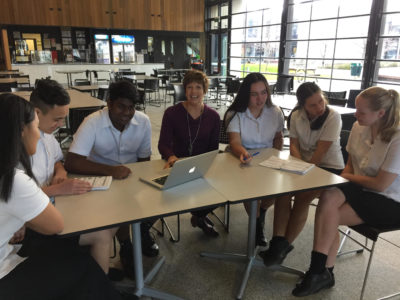
Ormiston Senior College will be doing things differently with Year 11 students and NCEA next year.
With schools becoming more aware of the adverse effect of continual assessment on adolescent mental health, come 2019, a new approach to NCEA in the first year of senior college has been planned.
Students will begin working towards NCEA Level 2 over two years instead of focusing on NCEA Level 1 for a year and then Level 2 the second year.
The school is committed to taking learning more slowly and allowing time for exploration and discovery.
Diana Patience, principal of Ormiston Senior College, says the current NCEA practice of a constant focus on assessment all year takes away from the process of learning.
“Real learning takes time. Employers are telling schools they are looking for students who not only have a good subject knowledge but also display the skills listed above,” she says.
“By making NCEA Level 2 a two-year journey, the school will focus on both in-depth content knowledge and the above dispositions.”
At present, the stress and pressure do not abate for the final three years of schooling. By taking two years to gain NCEA Level 2, assessments will not be so frequent nor the time frames so pressured.
“The only important qualification is the one the student leaves with. Once a student has achieved NCEA Level 2, they automatically achieve Level 1,” she says.
“The government is currently reviewing NCEA Level 1 and the changes we are proposing are in line with those up for discussion by the Ministry of Education.”
Assessments will not disappear. Students in Year 11 next year will have the opportunity to achieve some credits towards Level 1 or 2. Assessment will be linked specifically to attaining numeracy and literacy standards and working towards some Level 2 standards. This will have a knock-on effect of also making Year 12 less pressured.
Past and present students have been surveyed and a good number of the nearly 200 responses indicate that there should be more focus on learning and less on getting credits.
“The drivers for change are many,” says Ms Patience.
“The World Economic Forum has published the skills required to thrive in the 21st century. As well as the foundational literacies (numeracy, scientific, ICT, financial, civic and written literacy) they have listed creativity, critical problem solving, communication and collaboration as key competencies every person needs as they enter adulthood.
“They also add the character qualities of curiosity, initiative, persistence and adaptability. A school needs time to allow students to focus on developing such skills.”
She says that these changes will deepen students’ content knowledge, remove the high level of constant stress and provide time to embed the competencies outlined by the World Economic Forum.
“The response to this proposal from the community in the contributing schools has been overwhelmingly positive and innovative course design for 2019 is well underway,” she says.









